X
This article was co-authored by Alicia Ramos. Alicia Ramos is a licensed aesthetician and the owner of Smoothe Denver in Denver, Colorado. She received her license at the School of Botanical & Medical Aesthetics, with training in lashes, dermaplaning, waxing, microdermabrasion, and chemical peels, and now provides skin care solutions to hundreds of clients.
This article has been viewed 13,270 times.
Oils are a great addition to your skincare routine. Use oils as a cleaner, serum, or night cream. Choose oils that are appropriate for your skin type and consider adding extra essential oils to receive their wonderful healing properties. Enjoy the natural glow that the oils give your skin!
Steps
Method 1
Method 1 of 2:
Using Oils in Your Skincare Routine
-
1Consider using an oil-based cleaner if you have sensitive or dry skin. Whilst oils have great moisturising properties, they are also effective cleansers. Opt for an oil-based cleanser if you want to clean your skin without stripping it of its natural moisture and oils. Rub the cleanser over your skin in circular motions and then wash it off with water.[1]
- Sweet almond oil, grapeseed oil, avocado oil, sunflower oil, apricot kernel oil, and argan oil are often the base ingredients in oil-based cleansers.
- If you notice that your skin starts breaking out after using oils for cleansing, stop using them and use your regular cleanser instead.
- A gentle foaming cleanser is another great option for sensitive skin.[2]
-
2Apply 2-3 drops of oil onto your skin after moisturising it in the morning. Once you have washed your face, it is important to use both a moisturiser and a face oil in the morning, as the oil helps to seal the moisturiser into your skin. Place the drops of oil onto your hands and then rub it into the skin using circular motions. Avoid putting the moisturiser over your oil, as this doesn’t allow it to penetrate into your skin.[3]
- Apply your make-up over the oil to avoid smudging your make-up with the oil.
- If you have really dry skin, use 4-5 drops of oil. If your skin is very oily, only use 1-2 drops of oil when your face feels dry or tight.
- You can still use oils if you have cleansed your face with oils.
Advertisement -
3Rub 2-3 drops of face oil into dry or normal skin before you go to bed. The evening is a great time to apply a facial oil onto your skin, as it gives it a long time to sink in. This is particularly good if you have greasy skin and don’t want an oily sheen on your face during the day.[4]
- Apply oil to your skin at both morning and night if you want extra-glowy skin.
- If you have combination skin, simply apply the oil to dry areas. If you have oily skin, skip this step.
- Apply the oil after cleansing and moisturising.
Advertisement
Method 2
Method 2 of 2:
Choosing Oils for Your Skin
-
1Use jojoba oil for oily skin. If you have naturally greasy skin, you might notice that oils don’t sink into your skin very well. Jojoba is a great option if you have oily skin, as it is very light and helps to lessen your skin’s natural production of sebum. Over time, this can reduce the oiliness of your skin.[5]
- Purchase oils from a pharmacy or natural health store.
- If possible, use organic unrefined oils, as these will have the best moisturising properties.
- You can add essential oils to jojoba oil to nourish your skin.
-
2Try rapeseed, apricot kernel, argan, or marula oil for dry or normal skin. These oils help to moisturise your skin and give it a natural glow. Each of these oils are gentle on your skin and won’t clog your pores. This is important, as it helps to prevent your skin from breaking out.[6]
- Use these oils on your skin by themselves or add a drop of your favourite essential oil to them.
-
3Use vitamin E or rosehip oil if you have normal or sensitive skin. These oils are incredibly popular because they are great for normal and sensitive skin. Rub these oils into your skin every day or at times when your skin is feeling dry. Both of these oils can be used undiluted or mixed with essential oils.[7]
- The healing properties of these oils are great for lightening and healing scars.
-
4Add chamomile or frankincense essential oils to your base oil if you have oily skin. These oils have astringent properties and help to tighten your pores. Dilute these oils at a 1% ratio. Tip 99 drops of a base oil and 1 drop of essential oil into a dropper bottle and shake the bottle to combine the oils.
- Jojoba oil is a great base oil if you have oily skin.
- Avoid using any essential oils undiluted, as this can damage your skin.
-
5Try lavender essential oil if you have normal, dry, aging, or sensitive skin. Lavender has fantastic healing, moisturising, and antiseptic properties. This makes it a great oil for any type of skin. Dilute this oil at a 1% ratio or choose a facial oil that is infused with lavender. Tip 99 drops of a base oil and 1 drop of lavender essential oil into a dropper bottle and shake the bottle to combine the oils.[8]
- If you have any cuts or wounds on your face, lavender oil is a great healing option, even if you have oily skin.
- Almond oil and argan oil are great base oils to use with dry or aging skin.
-
6Try tea tree oil if you have acne-prone skin. This essential oil has wonderful anti-bacterial and antiseptic properties. This helps to keep your skin clean and reduces infection. Dilute tea tree oil in a base oil at a 10% ratio to prevent it from burning your skin. Add 90 drops of a base oil and 10 drops of tea tree oil into a bottle to create this ratio.[9]
- Look for a serum with tea tree oil if you want a ready-made natural solution for acne.
Advertisement
Expert Q&A
-
QuestionWhat avocado oil does to the skin?
 Alicia RamosAlicia Ramos is a licensed aesthetician and the owner of Smoothe Denver in Denver, Colorado. She received her license at the School of Botanical & Medical Aesthetics, with training in lashes, dermaplaning, waxing, microdermabrasion, and chemical peels, and now provides skin care solutions to hundreds of clients.
Alicia RamosAlicia Ramos is a licensed aesthetician and the owner of Smoothe Denver in Denver, Colorado. She received her license at the School of Botanical & Medical Aesthetics, with training in lashes, dermaplaning, waxing, microdermabrasion, and chemical peels, and now provides skin care solutions to hundreds of clients.
Skincare Professional Avocado oil is rich in vitamins and fatty oils that may help moisturize the skin and promote healing.
Avocado oil is rich in vitamins and fatty oils that may help moisturize the skin and promote healing. -
QuestionCan I use almond oil on my skin?
 Alicia RamosAlicia Ramos is a licensed aesthetician and the owner of Smoothe Denver in Denver, Colorado. She received her license at the School of Botanical & Medical Aesthetics, with training in lashes, dermaplaning, waxing, microdermabrasion, and chemical peels, and now provides skin care solutions to hundreds of clients.
Alicia RamosAlicia Ramos is a licensed aesthetician and the owner of Smoothe Denver in Denver, Colorado. She received her license at the School of Botanical & Medical Aesthetics, with training in lashes, dermaplaning, waxing, microdermabrasion, and chemical peels, and now provides skin care solutions to hundreds of clients.
Skincare Professional Absolutely! Almonds are heavily rich in vitamin E, which help your body's collagen production. Vitamin E also helps protect your skin against the sun and creates volume beneath the surface of the skin.
Absolutely! Almonds are heavily rich in vitamin E, which help your body's collagen production. Vitamin E also helps protect your skin against the sun and creates volume beneath the surface of the skin.
Advertisement
References
- ↑ https://www.thecut.com/2016/01/a-beginners-guide-to-beauty-oils.html
- ↑ Alicia Ramos. Skincare Professional. Expert Interview. 12 June 2019.
- ↑ https://www.refinery29.com/en-us/how-to-use-oil-on-skin#slide-1
- ↑ https://www.refinery29.com/en-us/how-to-use-oil-on-skin#slide-6
- ↑ https://www.thecut.com/2016/01/a-beginners-guide-to-beauty-oils.html
- ↑ https://www.thecut.com/2016/01/a-beginners-guide-to-beauty-oils.html
- ↑ https://www.naturallivingideas.com/essential-oils-for-skin/
- ↑ https://www.naturallivingideas.com/essential-oils-for-skin/
- ↑ https://www.naturallivingideas.com/essential-oils-for-skin/
About This Article
Advertisement
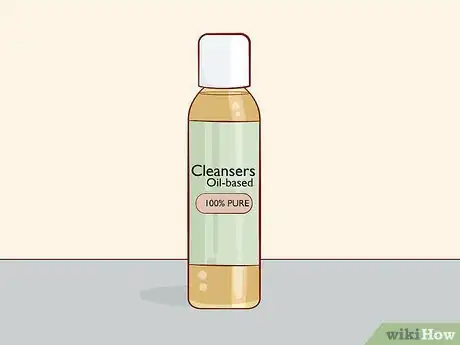


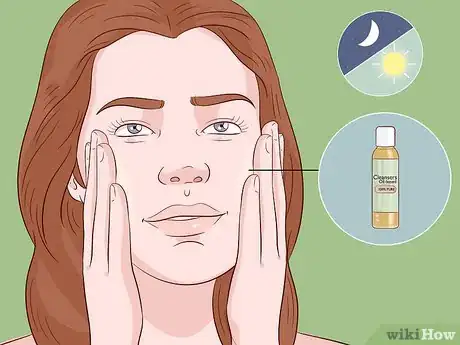
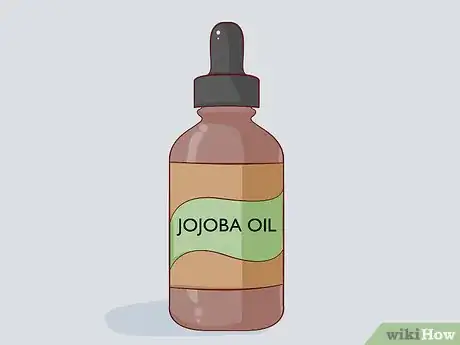
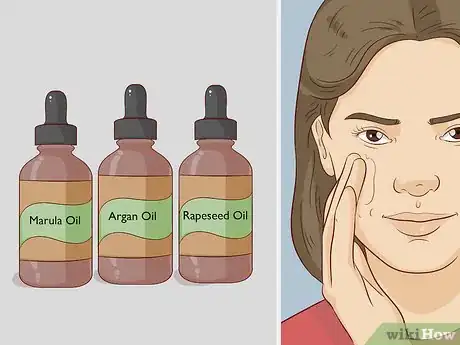
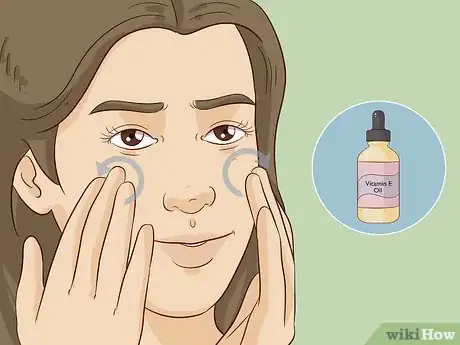
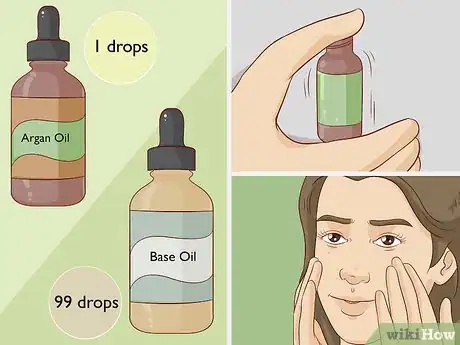
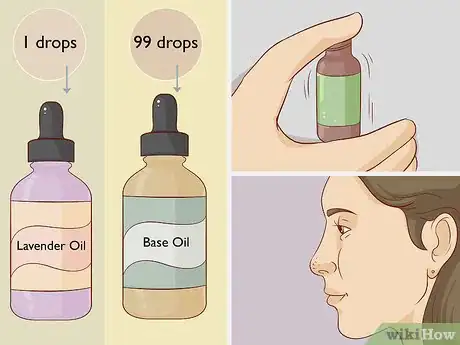
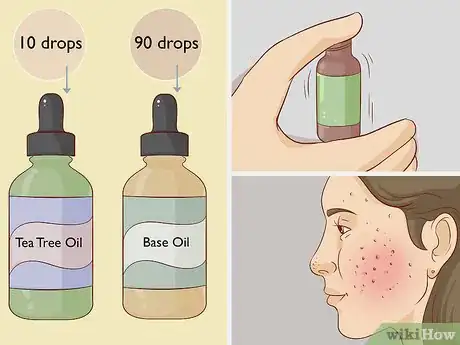


-Step-9-Version-2.webp)





-Step-1.webp)










-Step-9-Version-2.webp)



































